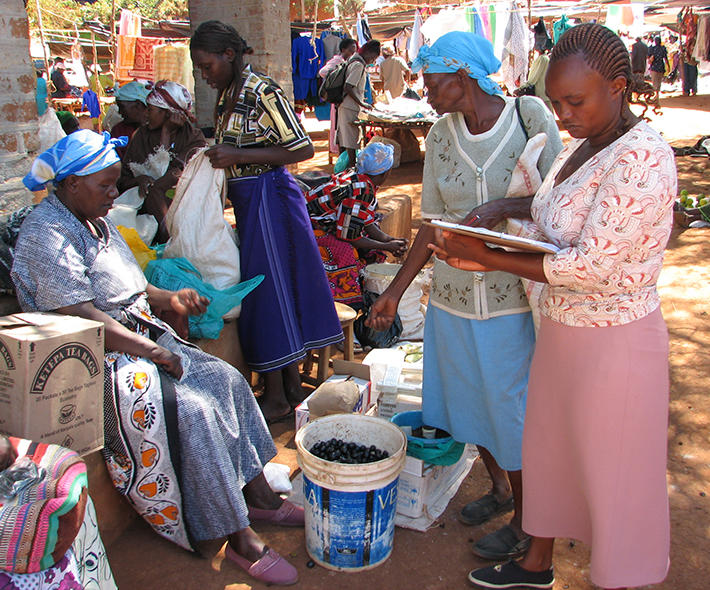Better data for better nutrition

A new tool, developed by Bioversity International and partners in Kenya, will ease the burden of measuring food intake thus helping decision-making in nutrition interventions. With a few adjustments, the tool could also be used in other parts of the world.
Is nutrition research capturing reliable food consumption data?
In Kenya, like in many other parts of the world, a large amount of nutrition research focuses on establishing people’s dietary patterns in order to determine the appropriate interventions to avert malnutrition. Evidence shows that the difficulty in finding the most suitable solutions is often due to a lack of reliable food consumption data.
Often, foods available and consumed during different times of the year are not captured, yet they largely contribute to the nutrition of communities at the specific times of their availability. These are mostly wild fruits and vegetables rich in essential micronutrients, that are often overlooked during the 24-hour dietary recall data collection – a research method used in nutritional assessment, which asks individuals to recall foods and beverages they consumed in the 24 hours prior to the interview. This happens mainly because consumers do not deem them as important foods hence they do not disclose the details to the researchers. Dietary intakes and their changes are as diverse as are the communities and seasons; thus we cannot assume that a one-size-fits-all intervention is representative of a nation.
Improving nutrition data with the Agrobiodiversity Diet Diagnosis Interventions Toolkit
Little research and documentation has been done on African traditional foods despite their significant contribution to meeting nutritional needs. In order to turn the situation around, Bioversity International, supported by the Japanese Ministry of Agriculture, Forestry and Fisheries is working with partners on a new tool called Agrobiodiversity Diet Diagnosis Interventions Toolkit (ADD-IT), using information and communications technology. ADD-IT will fast track the documentation of what people consume beyond the usual foods like rice, potatoes and maize.
The tool will work as an application on mobile devices to be used by community health volunteers who will administer it. The app will enable users to input all the foods they consume, including fruits and snacks acquired from the market, from their own farm and also from the wild. This consumption data is analyzed in real time to check whether it matches the recommended daily intakes of various vital nutrients. The app offers feedback for immediate action, by identifying dietary deficiencies and indicating all possible locally available foods that can meet them. “A crucial part of research for development is feedback. Being a mobile application, this new tool gives its users instant nutritional feedback and possible locally available solutions to deal with nutritional deficiencies,” said Dr Céline Termote, Bioversity International country representative at the launch event of ADD-IT held on 15 February 2018.
The data acquired through the ADD-IT tool will help research institutions and policymakers fill the knowledge gap about the consumption and acquisition of traditional domesticated and wild foods, and plan interventions where needed. Bioversity International and partners are currently piloting the tool in Kenya and, with a few adjustments, it could be used also in other parts of the world.
Documenting traditional and indigenous knowledge and species
According to the project’s country coordinator Patrick Maundu, food systems are fast changing as a result of globalization. It is therefore important to document food systems before the indigenous knowledge and species are lost.
To respond to this challenge, the tool will be community specific, with a database containing standardized local names of foods and recipes of different communities, thereby minimizing the possibility of wrong entries. The database will also include recipes with traditional and wild foods, seasonal calendars and market survey data to provide more insight into the various foods and their nutritional value.
A key partner in this endeavour, the National Museums of Kenya (NMK) harbours a wealth of scientific and genetic expert knowledge of plants and animal species. NMK – which focuses on researching, identifying and documenting edible species, and creating public awareness on the need to conserve them for sustainability – will also provide databases of indigenous foods and recipes that are vital for this tool. According to professor Gikungu of NMK, the tool will enable NMK to meet their mandate of conservation and utilization of available biodiversity. “Conservation can only be achieved through synergy with communities, and that community awareness and empowerment is key for successful conservation,” Gikungu said.
Effective nutrition intervention programmes largely depend on reliable quality data on people’s food consumption patterns, data that is unfortunately not available or up to date. “We very much appreciate that Bioversity International started this new project that will offer evidence-based decision-making.” Kenjiro Ban, Chief Officer, Initiative for Food and Nutrition Security in Africa (IFNA) Secretariat. He further notes that the success of Bioversity International’s new approach will provide community-specific agrobiodiversity data, which in turn will facilitate context-specific interventions.
The tool’s performance will be tested by local communities through their community health volunteers. They will receive technical support and assistance from volunteers from Japan International Cooperation Agency volunteer programme. The volunteers will be based in the study sites in Kitui and Vihiga where they will pilot the tool with the local team to identify gaps in its application. Once all gaps and issues are fixed, the ADD-IT tool will be released for use by other scientists and research institutions.
Click here for more information about the ADD-IT tool.
This research is supported by the Japanese Ministry of Agriculture, Forestry and Fisheries, and is part of the CGIAR Research Program on Agriculture for Nutrition and Health (A4NH), which is supported by CGIAR Trust Fund Donors.


